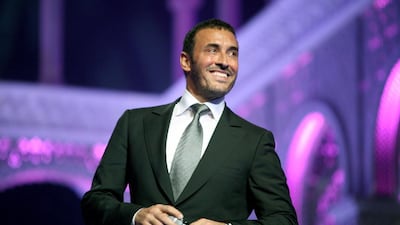Your recent song Bidi Ashrahlik Sho'ouri (I Want to Express my Feelings) is sung in a Khaleeji style. How did that come together?
That song is one of my favourites and I wrote it about two years ago. I love it because it turned out just the way I wanted and in a way that suits me. I will shoot a video for this song as well, which I am looking forward to.
Is there any truth to the rumours that you and the UAE's Hussein Al Jasmi will collaborate on a song?
He is one of the great Arab artists and I am a big fan of his voice. God willing there will be a collaboration. I don’t know how we will do it yet, maybe I will write a song for him and if he likes it he will sing it. Or maybe he wants me to perform a song with him. Either way, I will be very pleased to do it.
There was a time when you would rarely grant interviews or do press conferences. Is it fair to say that after two seasons of appearing on The Voice on MBC you are more relaxed in the public eye?
Indeed, I used to be a bit quieter. It’s not in my hands, I grew up as a bit of an introvert and I was never the kind to go out late and party. Even when I am working, after I perform a concert, I immediately go home and start working on more songs. I have to tell you, I pay deep attention and work hard when it comes to creating music. I am always thinking of new concepts and lyrics. The kinds of songs and poetry I am presenting are not easy. Also, the audience are very sharp and they are aware of everything such as the way I pronounce the words and they would point it out when I make a mistake. The Voice helped me break that barrier and be more laid-back.
You were the winning coach of last year’s The Voice. However, there are those who argue that, out of all the talent shows, it is the winners of Arab Idol who receive the most support after the show. Do you share that opinion?
I think that all of these shows have introduced us to many people who are indeed talented. When it comes to support, I do think Arab Idol contestants have it best because [the broadcaster] MBC stays with them and nurtures them after the show ends. With The Voice, the programme I am part of, MBC is not responsible for the winning contestant, it’s another company. So if you are with MBC you are lucky because they will be by your side until you indeed become a star.
That is surely a problem as such a situation will result in many talented people remaining undiscovered.
It is and I have always been saying that the big problem is what happens to these contestants after the lights go out, after the initial fame and being watched regularly on television by 100 million people ends. I feel that they should be supported and be given direction.
You have a busy lifestyle where you are now based in Dubai, but you travel regularly to Beirut for television work as well as to the United States and Europe for concerts. Do you ever miss those simpler times of your youth in Iraq?
Everything for me began in Iraq. I grew up there and I learnt many life lessons that I continue to use each day. I used to live in a very simple and poor area, but at the same time it was rich in that it was populated by people who were full of love, respect and were educated about the ways of the world. What I remembered about growing up was that the whole village will play a role in looking after you. So, if I did something that wasn’t right, my neighbour would let my dad know about my behaviour. Growing up like that, Iraq will always remain a part of me.
Is there a chance for you to return to Iraq for a performance?
There was a plan to play in Iraq recently. It was in partnership with Unicef and I would perform charity concerts first in Baghdad, then I would go to Basra, then Mosul and Irbil. That was the plan but then the situation on the ground changed and it became too dangerous. Lots of explosions occurred and tragically, as is always the case, many innocent civilians lost their lives. So the project was unfortunately delayed. I hope that whenever it becomes safer again, I would return to perform and help out in whatever way I can. I look forward to returning home to Iraq.
• Next up on Mawazine Sessions: we speak to one of the divas of World Music, Angélique Kidjo


